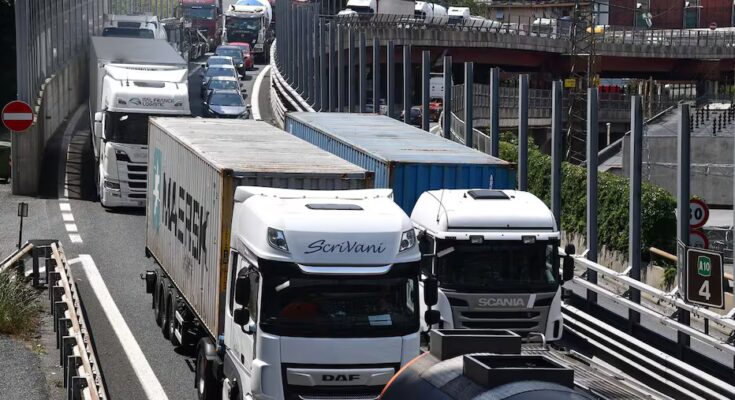The decision by Autostrade per l’Italia (Aspi) to ban overtaking trucks on the Tuscan stretch of the Autostrada del Sole (A1) from November 3 has sparked controversy and discontent in the world of freight road transport. The trade association spoke openly about “unilateral measures that impose sanctions on transport and logistics” and called for immediate talks with the Ministry of Transport and Aspi to evaluate “the real usefulness of such measures and identify a more balanced solution”.
But let’s start in order. The provisions, which affect a stretch of about 90 kilometers in both directions between the Incisa-Reggello (Florence) and Chiusi (Siena) toll booths, concern one of the busiest and most complex segments of the entire national highway network. Vehicles subject to this prohibition are vehicles with a total mass exceeding 12 tonnes. The line has two lanes in each direction, without tunnels but with a complex orographic conformation and registers a heavy traffic share of about 30% of the total, higher than the national average.
The ban is experimental and will last for six months. At the end of the period, Autostrade per l’Italia, together with the Ministry of Transport, local and prefectural authorities, will evaluate the data collected to decide whether to make it permanent or perhaps expand it to other similar sections. The overtaking ban provides for a fine of up to 666 euros, license suspension from one to three months and a deduction of ten points. The Traffic Police, in cooperation with the prefecture, will ensure inspections along the affected routes.
But road transport is not suitable. According to the company, the action was taken without any discussion with the associations representing the road transport and logistics sectors, which operate daily on the route and are aware of the actual critical issues. Alessandro Peron, secretary general of Fiap, said: «A unilateral decision of this magnitude, which directly affects travel times, operational costs and transport arrangements, cannot be taken without discussions with parties representing the company». According to initial estimates, the overtaking ban could lead to an increase in travel times of up to 30 minutes per route, impacting fuel costs, driver turnover and delivery timeliness, especially for food and medicine transportation and home distribution, where every minute counts.
Fiap recalled that the stretch represents a strategic axis for North-South connections and for the mobility of goods to and from the main production centers in Central Italy. Peron added: «Road safety is a priority shared by the entire sector, but this cannot be achieved with measures that only penalize industrial vehicles. If Autostrade per l’Italia and the competent institutions do not withdraw this action and do not open a concrete and binding table, Fiap will not stand by and watch.”



